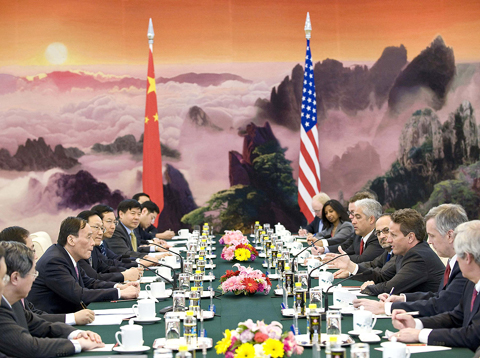US Treasury chief Tim Geithner began a two-day visit to Beijing yesterday by calling China and the US indispensable partners in solving the global economic crisis and other urgent world issues.
Geithner, who earlier this year described China as a currency manipulator, also used a speech at Peking University to urge his hosts to allow a more flexible exchange rate.
“China and the United States individually, and together, are so important in the global economy and financial system that what we do has a direct impact on the stability and strength of the international economic system,” he said.

PHOTO: REUTERS
“Global problems will not be solved without US-China cooperation. That goes for the entire range of issues that face our world, from economic recovery and financial repair to climate change and energy policy,” he said.
Geithner made the remarks ahead of discussions with Chinese Vice Premier Wang Qishan (王岐山) later yesterday and before meetings with Chinese President Hu Jintao (胡錦濤) and Chinese Prime Minister Wen Jiabao (溫家寶) today.
While praising Beijing’s strategy to address the global financial crisis, he urged China to deepen the reform of its currency regime.
“An important part of this strategy is the government’s commitment to continue progress toward a more flexible exchange rate regime,” Geithner said, according to an advance text of his speech.
“Greater exchange rate flexibility will help reinforce the shift in the composition of growth, encourage resource shifts to support domestic demand, and provide greater ability for monetary policy to achieve sustained growth with low inflation in the future,” the release said.
Geithner triggered anger in Beijing in January when he said in a written reply to a senator during a confirmation hearing that US President Barack Obama “believes that China is manipulating its currency.”
In April, Obama’s administration said China had not manipulated its currency to snare a competitive advantage, but insisted that the yuan remained undervalued.
During talks with the Chinese leadership, Geithner was expected to further address the issue while reassuring Beijing that its massive US bond holdings are safe despite concerns about Washington’s rising debt.
Thanks to its export-oriented economy, China has amassed the world’s largest forex reserves — amounting to nearly US$2 trillion — with much of it coming from huge surpluses with the US.
In his speech, Geithner also urged Beijing to open its markets to US imports and investment.
“I will be a strong advocate for US interests, just as I expect my counterparts to represent China’s,” he said at the university where he studied Chinese in the early 1980s.
“China has benefited hugely from open trade and investment, and the ability to greatly increase its exports to the rest of the world. In turn, we expect increased opportunities to export to and invest in the Chinese economy.”
He also said the US was prepared to support a larger role for China in the international system.
“The United States will fully support having China play a role in the principal cooperative arrangements that help shape the international system, a role that is commensurate with China’s importance in the global economy,” he said. “China is already too important to the global economy not to have a full seat at the international table.”

The Ministry of the Interior (MOI) is to tighten rules for candidates running for public office, requiring them to declare that they do not hold a Chinese household registration or passport, and that they possess no other foreign citizenship. The requirement was set out in a draft amendment to the Enforcement Rules of the Public Officials Election and Recall Act (公職人員選舉罷免法 ) released by the ministry on Thursday. Under the proposal, candidates would need to make the declaration when submitting their registration forms, which would be published in the official election bulletin. The move follows the removal of several elected officials who were

The Republic of China (ROC) is celebrating its 114th Double Ten National Day today, featuring military parades and a variety of performances and speeches in front of the Presidential Office in Taipei. The Taiwan Taiko Association opened the celebrations with a 100-drummer performance, including young percussionists. As per tradition, an air force Mirage 2000 fighter jet flew over the Presidential Office as a part of the performance. The Honor Guards of the ROC and its marching band also heralded in a military parade. Students from Taichung's Shin Min High School then followed with a colorful performance using floral imagery to represent Taiwan's alternate name

FOUR DESIGNATED AREAS: Notices were issued for live-fire exercises in waters south and northwest of Penghu, northeast of Keelung and west of Kaohsiung, they said The military is planning three major annual exercises across the army, navy and air force this month, with the navy’s “Hai Chiang” (海強, “Sea Strong”) drills running from today through Thursday, the Ministry of National Defense said yesterday. The Hai Chiang exercise, which is to take place in waters surrounding Taiwan, would feature P-3C Orion maritime patrol aircraft and S-70C anti-submarine helicopters, the ministry said, adding that the drills aim to bolster the nation’s offshore defensive capabilities. China has intensified military and psychological pressure against Taiwan, repeatedly sending warplanes and vessels into areas near the nation’s air defense identification zone and across

A Chinese takeover of Taiwan would severely threaten the national security of the US, Japan, the Philippines and other nations, while global economic losses could reach US$10 trillion, National Security Council Deputy Secretary-General Lin Fei-fan (林飛帆) wrote in an article published yesterday in Foreign Affairs. “The future of Taiwan is not merely a regional concern; it is a test of whether the international order can withstand the pressure of authoritarian expansionism,” Lin wrote in the article titled “Taiwan’s Plan for Peace Through Strength — How Investments in Resilience Can Deter Beijing.” Chinese President Xi Jinping’s (習近平) intent to take Taiwan by force